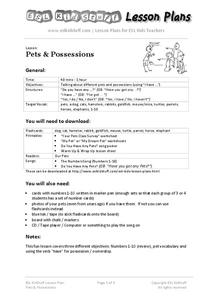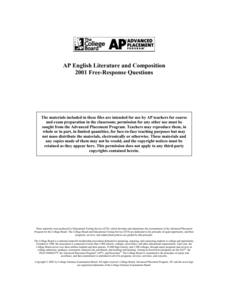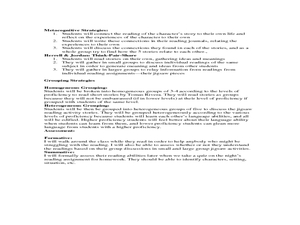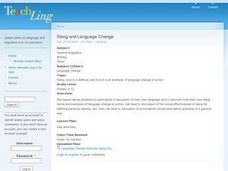ESL Kid Stuff
Actions - Present Continuous
What are you doing? Why, studying the present continuous tense, of course. Language learners engage in activities and exercises that provide them with practice crafting and answering questions using the present continuous tense.
ESL Kid Stuff
Past Tense Activities - Irregular Verbs: Part 2
The second part of a two-part lesson on irregular past tense verbs prompts language learners to add four more verbs to the list of twelve they have been working with.
ESL Kid Stuff
Numbers 1-20
Language learners engage in a series of games and activities designed to help them recognize and name the numbers from ten to twenty.
ESL Kid Stuff
Pets & Possessions
Language learners engage in a series of games and activities using pet vocabulary and the verb "have" to show possession or ownership.
ESL Kid Stuff
Subject Pronouns (I, You, He, She, We, They)
How are you feeling? Language learners practice using subject pronouns with adjectives by responding to questions, engaging in games, and singing songs.
ESL Kid Stuff
Prepositions of Location
Over, under, beside. Language learners practice using prepositions of location to answer the question, "Where is . . ."
ESL Kid Stuff
Places & Where We Live
Where does a cow live? Language learners engage in a series of activities that asks them to match animals with their habitats.
ESL Kid Stuff
Places in My Town
Introduce language learners to the present continuous tense with a series of activities that ask them to answer the question, "Where are you going?"
ESL Library
Intermediate Kwanzaa
As part of a study of holiday traditions, language learners read about the creation of Kwanzaa, the seven-day festival created by Dr. Maulana Karenga to celebrate traditional African values.
Curated OER
Literature and the Language Arts
Reading involves more than simply picking up a text and saying the words aloud. A practice guide introduces readers to key skills such as making inferences, finding the main idea or theme, and using context clues. Each skill contains a...
College Board
2001 AP® English Literature and Composition Free-Response Questions
Do 100 years make a difference? Scholars compare two poems written 100 years apart. They also analyze characterization used in a passage from Tom Jones by Henry Fielding. A final essay question allows writers to choose a piece of work...
Literacy Design Collaborative
Analyzing Language through Dialogue and Internal Monologue in "The Scarlet Ibis"
James Hurst's short story "The Scarlet Ibis" provides eighth graders with an opportunity to sharpen their literary analysis skills. After a close reading of the text, class members highlight and annotate parts of the dialogue and...
Curated OER
Hispanic and English Literature
Eleventh graders listen to a brief history lesson about the 40's and 50's mid-West America and the Migrant workers that worked the fields. Next, learners will read a short story written by Tomas Rivera (both in Spanish and English)....
Internet Archive
Introduction to Latin Language
Begin teaching your learners—and yourself—some basics about the Latin language with the inquiries available in this resource. Although the questions are linked to a textbook of unknown origin, they offer a good beginning on where to...
Curated OER
English Vocabulary Skills: AWL Sublist 4 - Exercise 6b
In this online interactive English vocabulary skills worksheet, students answer 10 matching questions which require them to fill in the blanks in 10 sentences. Students may submit their answers to be scored.
Cloud Front
Grammar Camp Worksheet Packet
Whip your students' grammar skills into shape with this series of practice worksheets. Touching on all eight parts of speech, these exercises challenge learners to identify the relationships between different words and phrases in sample...
Curated OER
Slang and Language Change
Slang, as an example of language change in action, is the focus of a short lesson that asks learners to contribute examples to a class list of terms that they use to separate themselves from other groups or adults. Consider expanding the...
Curated OER
Gender Neutral Language
Tackling gender issues in your class? This online quiz about gender neutral language might be for you! Learners re-write 10 sentences using gender neutral language. When they have finished re-writing each sentence, they can check their...
Curated OER
English Vocabulary Skills: AWL Sublist 6 - Exercise 3b
For this online interactive English vocabulary skills worksheet, students answer 10 matching questions which require them to fill in the blanks in 10 sentences. Students may submit their answers to be scored.
Curated OER
Language Play
Can you say it 10 times fast? Tongue twisters are a fun way to practice reading fluency. Learners read five common twisters, then make up one of their own! Discuss why some words and phrases are difficult to say quickly, and be sure to...
Curated OER
Two Sides, Same Coin: How Political Beliefs Influence Language Use
Learners read several magazine articles on the same topic written from different political perspectives, paying particular attention to the diction, syntax, and arguments presented in support the point of view expressed. They then select...
Curated OER
Figurative Language: Simile and Metaphor
What is figurative language? Introduce your young learners to the most popular forms of figurative language: the simile and the metaphor. Start by reading "Willow and Ginkgo" by Eve Merriam, and identify where similes are used. Then look...
Curated OER
Formal and Informal Language
Use this resource to prepare your class for an interview unit, a presentation activity, or to simply rid their writing of informal expressions. It prompts learners to identify whether listed expressions are formal or informal. Note: The...
Curated OER
English Skills Worksheet
To practice English skills using spelling words, learners answer 10 questions, some of which ask them to use a spelling list, though none is included. The questions cover the following topics: spelling, parts of speech, alliteration,...

























